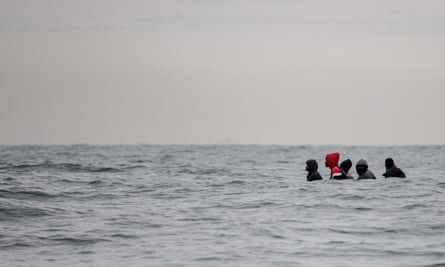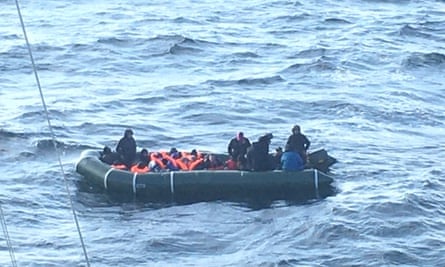Louise vividly remembers her first Channel watch. She had just moved from London to Dover when, one morning last autumn, she got up at half past five. After a few tries to get her 1980s moped going, she was off. “I’m driving through the mist on top of the cliffs, racing to meet a man in the dark.” Fifteen minutes later, she was at the car park of a local golf course, metres from the cliff edge. The only car there belonged to her fellow volunteer. “I met Joe and he was totally lovely. We chatted and watched the darkness through a telescope. And then, very slowly, watched it get light.”
Magnificent as it was, Louise, 30, and Joe, 36, were not there for the view. They are volunteer human rights observers for Channel Rescue (CR), established in 2020 as a citizens’ response to last year’s surge in migrants attempting to cross the Channel from France. The originators were a loose group of anti-racist and anti-fascist activists based, mostly, in London. They crowdfunded £19,000 and modelled their mission on the longstanding human rights monitoring around the Greek island of Lesbos.
With the Home Office’s announcement of punishing proposals to make claiming asylum in the UK much harder, CR’s work takes on new meaning. In future, those arriving by small boat across the Channel may be indefinitely liable for removal precisely because of how they reach UK shores, even if they are later granted asylum. People entering by means deemed illegal by the UK government will be further punished with limited family reunion rights and limited access to benefits.
“We should be assessing people’s need for protection based on their case, not creating a two-tiered system of ‘deserved’ and ‘undeserved’ refugees on the basis of the risks they are forced to take to reach safety,” says Maddie Harris, who helped set up Channel Rescue and works for the Humans for Rights Network.

Despite this development, CR remains committed to its fundamental mission. Joe explains that volunteers “keep an eye on Border Force, to make sure they fulfil their legal duty of providing safety for people trying to cross. We observe through spotting scopes in 15-minute shifts.” If they see a migrant boat in the water, they alert the RNLI or coastguards. If they see Border Force intercepting a migrant boat, they note coordinates, timings, which BF vessels are involved, and any human interaction they can see. Everything is then logged securely, “in case that information is required later, for example, in a court of law”.
Currently, due to the pandemic, all the observers live in this corner of the Kent coast, less hardened activists and more concerned local residents. Technical and legal training is provided over Zoom, by activists with expertise in seafaring, first aid and human rights. Each volunteer is also vetted, to mitigate the threat of infiltration, which has already happened. CR will not go into details but a local anti-migration activist was recognised and peacefully removed from the group.
In future, there are plans to use more of the money to buy a boat for up-close monitoring, and to meet arrivals on the beaches with “snacks and a foil blanket”. Beyond that, there is little they can do. “I couldn’t give someone a lift to Canterbury once they’ve landed because I could be seen to be assisting people trafficking,” says Joe.
The volunteers meet on the cliffs anywhere between south Thanet and Folkestone and take turns to scan the horizon. Joe, a husband, father, academic and part-time farmer, is the longest-serving local volunteer. The scopes, he says, give good visibility as far as the border, an imaginary line along the Channel exactly halfway between the UK and France.
The crossings almost always start at night. Migrants are pushed off French beaches by people smugglers, but the boats are often barely seaworthy. Migrants must navigate themselves; with no experience or training, they cut straight across the Channel, the busiest shipping lane in the world.
CR volunteers start before dawn and stay until around midday, going out as often as work and family commitments allow. They all feel it is the least they can do for people in what Joe describes as “the most desperate circumstances possible”.
Every boat he has spotted since last year has been intercepted by Border Force. “They offload the guys and then one of the other smaller boats will drag the empty dinghy back.” For human rights observers like him, there is an ambivalence to rescues by any authority. “You know those people aren’t going to die at sea and you feel happy Border Force are doing that. At the same time, you also know they’re likely either to be deported or go to a detention centre. And the conditions are going to be really shitty. It’s a very solemn thing to observe.”
Harris says that from the point at which migrants arrive at Dover harbour, observation becomes much harder. “You can’t get anywhere near people … because of coronavirus. The ability for us to connect and communicate with them is quite challenging. It’s also challenging in that people are taken to mysterious locations, whether that be a hotel or detention centre.”
Often a clear sense of what someone has experienced is only possible later. “People talk about claiming asylum in the UK as a trauma that never goes away. It is so incredibly hostile, and is becoming increasingly more so.”
Harris sees the latest announcement from the home secretary, Priti Patel, as direct evidence of this. For human rights advocates like Harris, the “illegal” v “legal” narrative is a distraction and an injustice in and of itself. Indeed, Amnesty International is one of many organisations to publish myth-busting resources on this topic, pointing out that neither the Geneva conventions nor EU law require refugees to claim asylum in the first “safe” country they reach.
Harris makes it even clearer: “No human is illegal and the UK must ensure it recognises its obligation under the Geneva conventions to uphold the rights of all people in need of protection.”
Since 2014, across the Mediterranean, activists have documented thousands of illegal push backs of small boats across Europe’s external borders and, according to the UN’s International Organization for Migration, almost 20,000 migrants have died. While Channel Rescue is quick to acknowledge that its volunteers have not witnessed illegal behaviour by the UK Border Force, the government’s attitude to migration is a constant concern. Harris says: “We’ve literally got Priti Patel saying that they’re gonna push the boats back. That’s against human rights and international law but that really could happen.”
The home secretary’s interest in controversial, Australian-style “push the boats back” tactics has been widely reported. All of the options reportedly trialled, one of which was a floating blockade in the middle of the Channel, have been discredited by maritime organisations and condemned by Labour and numerous human rights organisations and lawyers.
CR volunteers fear that, heading into spring, warmer weather and calmer seas will lead to more crossings and more lives lost in the Channel. Alongside this is heightened fear of illegal action by UK or French authorities. Something they already monitor is Border Force’s use of its Automatic Identification System (AIS), a satellite tracking system for avoiding boat collisions that has become the global standard for vessels of all sizes.

“We see Border Force going up the coast but on the ship-tracking apps, it’s not on there. And so you know that it’s switched off. Or you look at the history of what they’ve been up to and they got up the coast and then somehow flew from like north Kent, back to Dover, across land.”
Charlotte, 40, is a working single parent from Folkestone and has volunteered for Channel Rescue since late 2020. For her, it is as much about bearing witness as accountability. “It’s a local welcome, as well as a British welcome. It counters the local arguments about people arriving. I don’t know whether you are aware of local opinions on social media …”
Each of the volunteers makes a similar reference to social media and local rightwing activists whose own “monitoring” work is the mirror image of Channel Rescue’s. Charlotte describes them best as “a visible unwelcome”. On his public Facebook profile, a local man, for instance, gives daily updates on Border Force activity. A post from 9 January reads: “My count were [sic] up to five boats now so roughly 50 migrants. I’m still out on patrol just in case.” In the comments, frustration is often directed at the home secretary: “WHAT ARE YOU DOING ABOUT THIS PRITI PATHETIC.”
The same anti-migrant sentiment is rife on neighbourhood social media pages. Joe, who grew up in Deal (town motto: adjuvate advenas meaning “befriend the stranger”), is frustrated by what he believes is a loud minority of anti-migrant keyboard warriors. An asylum seeker housed in the area explains how seeing anti-migrant comments online left them feeling. “There are a lot of racist people there, they broke me … now Folkestone is like hell for me.”
For Joe, it further complicates how he feels about his activism and Britishness in general. “If you say you’re a patriot, you’re associated with a hate for people from other countries. I wouldn’t call myself a patriot – not because I’m not proud of the good things we do. It’s just I feel so much shame over the people that bastardise that.”
He points to Kent’s recent history of welcoming asylum seekers. According to Kent Online: “During a single day in mid August 1914, around 16,000 Belgian refugees landed in Folkestone harbour, instantly doubling the number of people in the coastal town.” Local people are said to have provided the new arrivals with up to 6,000 meals a day. Up the coast, the town of Sandwich in 1939 gave refuge to 4,000 Jewish men.
The obvious difference to past arrivals is the vast majority of those coming now are not white. Harris believes migrant solidarity organisations themselves need to do more to address this head-on. “We’re not really tackling the heart of the problem, which is racism. We’re skirting around the edges, saying: ‘We’re not really receiving many people.’”
Louise, who describes herself as mixed race but white passing, says she joined Channel Rescue because “it meant that I would meet other people who are explicitly anti-racist around this area”. She is glad to have found exactly that in the form of Joe and her fellow volunteers fighting for the rights of those desperately crossing the sea to find safety.
